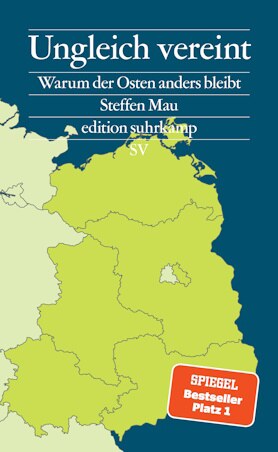Non-fiction
Steffen Mau
Ungleich vereint. Warum der Osten anders bleibt
[Unity Without Equality. Why the East is Still Different]
Is the East an invention of the West or did the East invent itself?
Steffen Mau looks at a divided country and sees some perspectives.
For a number of years now, there has been a heated debate in Germany about the state of the country. Especially since the sweeping success of the rightwing populist “Alternative for Germany” (AfD) party in several state-parliament elections in the “new” federal states of the East – “new” despite having joined the Federal Republic of Germany thirty-five years ago. The champions of democracy are left asking themselves what went wrong during and since German reunification. Why have so many people in eastern Germany not only become tired of democracy but downright hostile to it since the anti-Muslim PEGIDA movements and the so-called Querdenker or “lateral-thinker” protests? Why is it that three and a half decades after the peaceful revolution in the East and the merging of East and West Germany so many Easterners feel like a marginalized minority in a West German majority society and increasingly express their dissatisfaction at the polls?
Not only the architects of Gertman reunification but also the children of the reunification and post-reunification are wondering why this is so. Strangely enough, young Germans in the East who did not experience the GDR first-hand but grew up with parents in crisis mode tend to take a sympathetic view of the last citizens of the GDR. Seldom do they judge them harshly. Instead, they empathize with the stolen lives of the elder generation, lives which, according to surveys, the younger generation identifies with more strongly than the protagonists of the peaceful revolution do.
Among scholars, two dominant factions have meanwhile formed when it comes to interpreting the East and its inhabitants. On the one hand there are the historians and sociologists who advocate for a positive reassessment of daily life in the GDR and whose attempts to rehabilitate the East are met with great approval from Easterners in particular. Another group of professional observers sees the political mood in the eastern part of the country as the logical continuation of a failure to come to terms with the experience of violence under two dictatorships. Both camps are highly emotional and hostile towards each other.
Sociologist Steffen Mau, who was born in Rostock in 1968 and is now a professor in Berlin, attempts to bridge the gap. He views the situation between 1989 and 2024 in terms of raw statistics. In doing so he elegantly debunks a couple of recently established opinions. For instance, the view widely propagated since the appearance of literary critic Dirk Oschmann’s and historian Katja Hoyer’s rehabilitative narratives (what Mau calls “mental-care books”) that “the East” is a “construct” of the West which, according to the logic of postcolonial thinking, has “othered” part of the population.
Mau presents the following counterarguments. On the one hand, he insists on abandoning, even in scholarly contexts, the ideal of pursuing “convergence” between East and West, insisting instead on a recognition of their inherent differences. Because to him the differences are glaring. The East is simply different: the economic, political and mental differences between eastern and western Germany are undeniable and shouldn’t be denied if the proponents of a pluralist society are willing to put their money where their mouth is. If we want to understand East and West, we have to understand the foundations each one is built on.
On the other hand, Mau bolsters his arguments with a wealth of survey material. Thus, he can calmly assert that the East is no mere invention of the West. Studies have shown that the West German majority society barely has the East on its radar. West Germans have had little to no perception at all of differences between themselves and East Germans. “From the perspective of a majority society it is often difficult to even notice the experiences of others. Fish don’t recognize the water they swim in.” Conversely, this disinterest of the majority in the experiences of others can be perceived by the minority as an insult. The progressive positing of an East German identity is therefore, according to Steffen Mau, primarily an act of self-marginalization – though certainly understandable from a psychological perspective.
In “Unity Without Equality,” Mau considers the East from every statistical perspective. What becomes apparent is a society that has been dramatically shrinking since 1989, particularly in rural areas, one that is marked by a conspicuous lack of women, that is only partly economically disadvantaged, and that finds little support historically in local party associations. The result has been the decades-long emergence of “frustrated regions” that are often politically passive and are characterized by a pronounced fear of losing their identity. Despite the considerable need for immigrants, not least because of a shortage of skilled labor, xenophobic sentiments are not uncommon in these areas. And it is here that the AfD has succeeded in politically exploiting these diffuse fears. Other parties have followed suit when it comes to topics such as migration or gender, but are often perceived as jumping on the bandwagon.
By simply describing the situation on the ground, Steffen Mau offers a painful critique of East German political and cultural mentalities. But he is also fair enough to acknowledge that in post-reunification society the “contribution of local actors was only in demand to the extent that it meant implementing in the East what had already been tried and tested in the West.” Grassroots experiments of the transition period and new forms of political participation such as the “round tables” were ignored. A renaissance of direct civic engagement, he hopes, might be able to overcome the East’s “crisis of confidence” in parliamentary democracy. Mau sees an affirmative-action program and a quota system for East German elites as a means of turning the East’s crisis of democracy into a crisis-management strategy for Germany. His slender, sober and elegantly written book about German crisis regions offers abundant food for thought and illustrative material.
Translated by David Burnett
By Katharina Teutsch
Katharina Teutsch is a journalist and critic. She writes for newspapers and magazines such as: the Frankfurter Allgemeine Zeitung, Tagesspiegel, die Zeit, PhilosophieMagazin and for Deutschlandradio Kultur.


